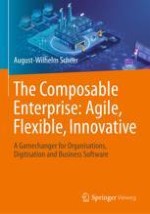2024 | OriginalPaper | Buchkapitel
10. Digital Industry Concepts for the Composable Enterprise
verfasst von : August-Wilhelm Scheer
Erschienen in: The Composable Enterprise: Agile, Flexible, Innovative
Verlag: Springer Fachmedien Wiesbaden
Aktivieren Sie unsere intelligente Suche, um passende Fachinhalte oder Patente zu finden.
Wählen Sie Textabschnitte aus um mit Künstlicher Intelligenz passenden Patente zu finden. powered by
Markieren Sie Textabschnitte, um KI-gestützt weitere passende Inhalte zu finden. powered by
